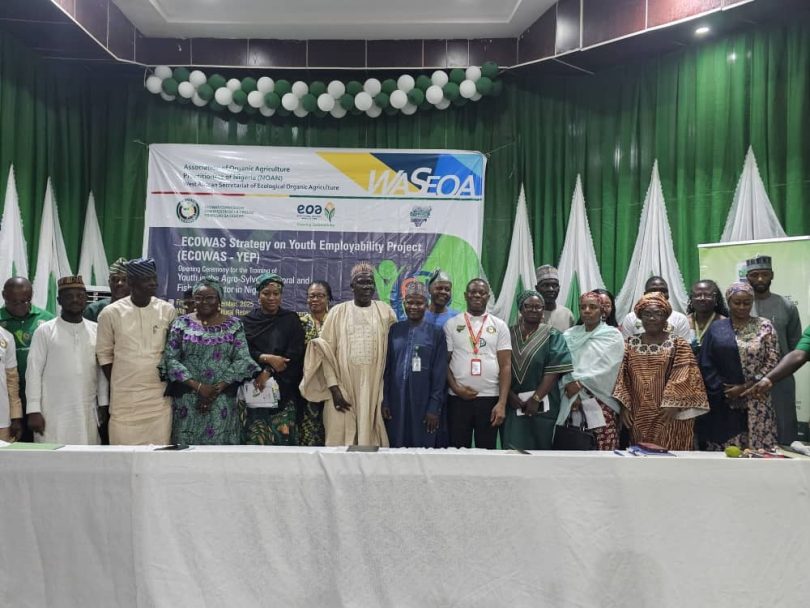By Olugbenga Salami
Economic Community of West African States Youth Employability Project, ECOWAS-YEP, in collaboration with the Association of Organic Agriculture Practitioners of Nigeria, NOAN, has launched a new initiative designed to tackle high youth unemployment, food insecurity, climate change, and the unsustainable exploitation of natural resources in Nigeria.
The initiative, organised by ECOWAS-YEP, and being implemented by NOAN, would specifically help in equipping young people with practical skills in sustainable agriculture, agro-sylvo-pastoralism, and fisheries, is part of the broader ECOWAS Agricultural Policy, ECOWAP and aligns with the African Union’s Agenda 2063.
Already, over 15,000 youths across West Africa have benefitted from ECOWAS training programmes, with Nigeria now expected to take the lead in scaling impact.
Declaring the project open on Friday at the Agricultural Research Council of Nigeria, ARCN, Abuja, the Minister of State for Agriculture and Food Security, Senator Dr. Aliyu Sabi Abdullahi, outlined the government’s priorities under the programme to include, expanding agroecology and organic agriculture to restore soil fertility, reduce chemical dependence, and open premium export markets and establishing agribusiness incubation hubs across the six geopolitical zones to train and support youth cooperatives.
Abdullahi, who was represented by his Technical Adviser, Mohammed Jobdi, listed others as scaling up eco-friendly fisheries and aquaculture to modernize production, reduce post-harvest losses, and attract young entrepreneurs and strengthen sustainable livestock systems to reduce rangeland degradation and farmer-herder conflicts.
The minister added the government is also promoting agroforestry, climate-smart agriculture, and nutrition-focused food systems to position Nigeria as a regional leader in sustainable farming.
He, therefore, urged the participants to seize the opportunity, saying: “My dear Nigerian youths, this project is for you and about you. You are not just the leaders of tomorrow—you are the protagonists of today. With your creativity and resilience, you can make agriculture attractive, profitable, and sustainable.”
According to him, ECOWAS-YEP would provide not only training, but also mentorship, start-up resources, and market linkages to help young people transition from job seekers to job creators.
He, however, pointed out that the success of the project would depend on collaboration, highlighting the roles of the Association of Organic Agriculture Practitioners of Nigeria, NOAN, farmer cooperatives, universities, donor agencies, and local governments in driving its sustainability.
In his remarks, the President of NOAN, Professor Jude C. Obi described the programme as “more than training—it is a movement to build a generation of digitally savvy, environmentally conscious, and business-minded agri-preneurs.”
He said: “Agriculture is no longer a fallback plan or a subsistence occupation. It is a pathway to innovation, entrepreneurship, and national prosperity.
“The trainees themselves are entering diverse fields within organic agriculture: 36.7 percent opted for biological input production, 32.7 percent chose organic crop diversification (notably sesame and ginger), and 30.6 percent selected vegetative propagation of high-value crops.”
ECOWAS Director of Agriculture and Rural Development, Dr. Gle Koffi Emmanuel said the region’s greatest wealth lies in its youthful population, disclosing that over 60 per cent of West Africa’s 450 million people are under 30.
“This youthful energy can either become a ticking time bomb or the driver of prosperity. Three out of every four young people entering the labour market cannot find decent work. Through agriculture, we have the chance to change that,” he said.
The ECOWAS strategy, he explained, goes beyond temporary fixes, saying “it is designed to transform agriculture and agri-food value chains, making them productive, sustainable, and attractive to youth.”
“By 2030, the Commission expects one in every four new entrants into the job market to find meaningful employment in the agro-sylvo-pastoral and fisheries sectors,” Emmanuel added.
According to him, the plan focuses on six pillars: raising awareness of agricultural opportunities, vocational training and incubation, investment in youth-led enterprises, access to land and markets, settlement support, and promoting agroecology.
To back these ambitions, he disclosed that the ECOWAS has mobilised significant funding, stressing that “between 2024 and 2025, the Commission allocated over $2.2 million in grants to training centres across member states, including Nigeria.”

